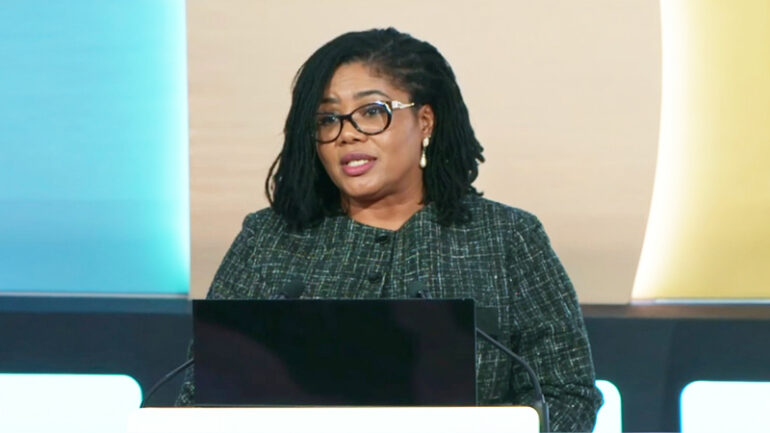The Second World Summit for Social Development 2025 (Doha, Qatar)

Dr. Agnes Naa Momo Lartey (MP)
Minister for Gender, Childen and
Social Protection of the Republic of Ghana
Plenary Hall, Qatar National
Convention Centre, Doha
5th November 2025
SECOND WORLD SUMMIT FOR SOCIAL DEVELOPMENT (WSSD2)
Madam President, I thank you for giving me the floor.
I bring you warm greetings from His Excellency President John Dramani Mahama and from the people of the Republic of Ghana. We also commend the State of Qatar for hosting this important Summit and for its continued leadership in advancing global dialogue and partnership for social development.
Ghana aligns itself with the statements delivered by the distinguished representatives of the Group of 77 and China and the African Group and wishes to make the following remarks in our national capacity. Thirty years after the Copenhagen Declaration, the world gathers once again to renew our shared vision of a just and inclusive world where every individual enjoys dignity, opportunity and participation in society. This Summit reminds us that social development is a collective responsibility. In a time of economic shocks, inequality, climate change, and conflict, no nation can achieve the Sustainable Development Goals alone. We must act together, in solidarity, to place social justice and human dignity at the centre of global development.
Madam President,
Long before the Copenhagen Declaration, Ghana had already embarked on national strategies to reduce poverty and improve living standards. Under successive medium-term frameworks, we have kept poverty eradication, productive employment, and social inclusion at the heart of development. From the Ghana Poverty Reduction Strategy to the current Resetting Ghana Framework: Creating Jobs, Ensuring Accountability and Promoting Shared Prosperity (2026–2029), our focus has remained clear: to put people first and ensure that no one is left behind. Ghana’s progress reflects this commitment.
Poverty declined from 31.9 percent in 2006 to 23.4 percent in 2017, and extreme poverty from 16.5 to 8.2 percent. Currently, 24.3 percent of the population is classified as multidimensionally poor. The downward trend in poverty was a result of targeted interventions in education, health, employment, and social protection. These gains stem from a coordinated approach that integrates social protection as a pillar of development. In 2025, Ghana enacted the National Social Protection Act (Act 1148), our first comprehensive law on social protection, establishing a unified framework to coordinate and legally safeguard national interventions for the
poor and vulnerable.
Flagship initiatives such as the Livelihood Empowerment Against Poverty (LEAP), School Feeding Programme, Free Senior High School Policy, and the National Health Insurance Scheme continue to deliver tangible results. LEAP supports 350,000 households, while the School Feeding Programme provides daily meals to over 4 million pupils in 12,000 deprived schools. These are not acts of charity but deliberate investments in justice, equity, and human capital. The Macro Finance and Small Loan Scheme (MASLOC) provides loans to small-scale businesses at low interest rates to ensure the businesses thrive, especially womenrun businesses which form majority of beneficiaries. Employment remains central to inclusive growth. Through the National Employment Policy and youth employment initiatives, Ghana is expanding decent and green jobs for youth and women. In the past year, more than 100,000 young entrepreneurs have received training or start-up support. We are preparing our workforce for digital and green economies that will define the future.
Madam President,
Ghana’s vision of inclusion is guided by the principle of Leaving No One Behind. We continue to advance gender equality and equity as well as the rights of persons with disabilities through strong legislation and institutional reforms. The Affirmative Action (Gender Equity) Act, 2024 (Act 1121) and the National Gender Policy (2025–2034) provide a solid foundation for women’s
participation in leadership.
Today, women constitute 14.5 percent of Members of Parliament and 22.7 percent of Ministers. The swearing-in of Ghana’s first female Vice President this year marks a defining milestone in our democratic journey. In October this year, President Mahama launched the Free Tertiary Education Policy for Persons with Disabilities, supported by an annual allocation of 50 million Ghana cedis from the Ghana Education Trust Fund (GETFund) to provide scholarships for Persons with Disability; a transformative step towards inclusive education and opportunity. We are also advancing the Persons with Disabilities Bill, 2025, aligning national law with the UN Convention on the Rights of Persons with Disabilities to promote protection, accessibility, and full participation.
Madam President,
As we look to the future, Ghana remains resolute in consolidating gains and accelerating progress. We will:
• Deepen social protection under Act 1148;
• Expand decent and green jobs for youth and women;
• Implement the Affirmative Action Act to bridge leadership gaps;
• Bridge digital divides and promote innovation; and
• Ensure sustainable financing through domestic resource mobilisation and international partnership.
Ghana’s journey affirms that social progress does not occur by chance. It results from deliberate choices; to invest in people, to protect the vulnerable, and to uphold human dignity. As we meet here in Doha, let us renew our collective determination to build a fairer, more inclusive and more resilient world. Ghana remains firmly committed to multilateral cooperation and to the principles that underpin the 2030 Agenda for Sustainable Development. We stand ready to work with all nations and partners to accelerate social transformation, strengthen global solidarity, and ensure that no one is left behind.
I thank you.
